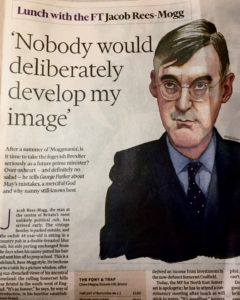I forget who it was who said that “if you can fake authenticity, then you’ve got it made”, but I’ve been thinking about it ever since reading Dave Eggars’s thoughtful report from Phoenix in the aftermath of Trump’s speech there. I blogged about it a few days ago. The nub of his report was an account of a conversation he had in the evening with a pair of Trump supporters.
Outside in the cooling night, it occurred to me that these bright young men … were drawn to Trump not for what he was saying, but how he said it. It did not matter so much what he said. Or if he lied. Or if he inflamed animosities or bullied opponents. What mattered was that his unstudied, unrehearsed way of expressing himself was itself evidence of honesty. They equate unfiltered expression with truth.
Thus a politician who speaks carefully, who measures his or her words — or worse, who reads from a prepared speech — is being a politician, i.e., someone who does not tell the truth. Conversely, someone who speaks off the cuff, who has no script, who tweets without any consultation from staff, is inherently more honest.
This is one of the most insightful observations about our current politics that I’ve come across. And I can understand only too well why people might think like this. I listen to the Today programme on BBC Radio 4 most mornings, for example, and sometimes wind up shouting at the radio when a seasoned member of the political elite has avoided — for the fifth time — giving a straight answer to what seems like a straight question.
Calming down, I remember that there are two possible reasons for this evasive behaviour, one bad, one good. The bad reason is that it’s all about ‘staying on message’ — in other words it’s about the requirements of political spin. The good reason is that questions about public policy are usually genuinely hard to answer simply, never mind in a sound-bite; indeed often there is no simple answer to even apparently straightforward questions.
Our wider political problem therefore comes from the fact that many (most?) citizens have come to perceive plain speaking — even when it’s clearly mendacious or untruthful — as a proxy for ‘authenticity’. Which — as we now see — means that charlatans like Trump (in the US) or Nigel Farage (in the UK) have been having a field day.
Which brings me to the question of the Tory succession, as Theresa May limps towards Brexit. For over a year, one of the likely contenders was Boris Johnson, a charlatan who got a lot of mileage out of faking authenticity — as the chap who always blurted out what he was thinking, or couldn’t resist an opportunity for a cheap joke. Just like the guy who is the life and soul of the saloon bar.
My hunch is that Johnson’s shelf-life has expired. The spectacle of him making a fool of himself as Foreign Secretary is just too embarrassing even for people who want to screw the entire system.
A more interesting case is that of Jacob Rees-Mogg — “the Hon Member for the 18th Century” — who was briefly touted by some lunatics as a possible successor to Theresa May during the silly season of August. He is, says George Parker, the Financial Times Political Editor,
“the man at the centre of Britain’s most unlikely political cult”. Young Conservatives, writes Parker, “celebrated his rugged Euroscepticism, confident backing of Brexit and rejection of the centrist policies offered by Theresa May. Meanwhile, his views on women’s reproductive rights and gay marriage prompted liberal outrage as it became clear that his genteel and self-deprecating persona was the overlay for an entrenched social conservative whose views sometimes sound more in tune with the right of the Republican Party than the 21st-century Tory party”.
Parker took Rees-Mogg to lunch in an upmarket country eatery in his constituency, and produced an interesting and perceptive profile (in this weekend’s edition of the paper, sadly behind a paywall). Mogg comes over as a toff with impeccable manners who takes being a Parliamentarian seriously — the kind of MP who might one day become Speaker of the Commons. But what’s really interesting about the interview is that he seems all of a piece. His fogeyism is not an act, in other words, even though it’s so preposterous sometimes that that’s hard to believe. (He’s just named his sixth child ‘Sixtus’). So he’s authentic all right, but that will never make him a populist hero — because he’s not faking it.

